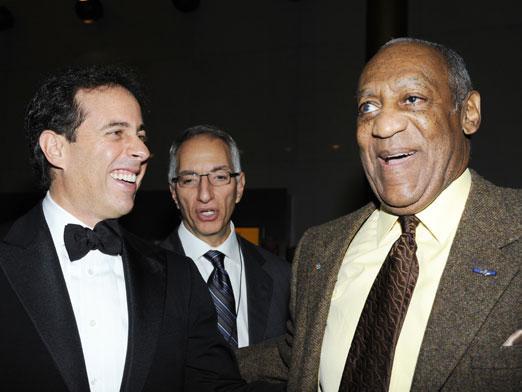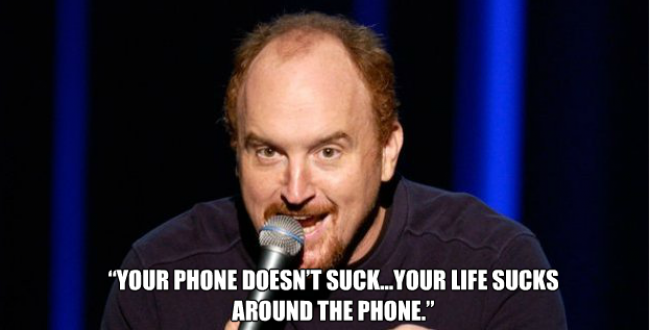
I wasn’t always good at public speaking. I remember blowing one of my first presentations out of University at an event I was far from prepared for. It was a disaster but it was that moment I knew I had to step up my game and never face that kind of embarrassment again.
As you navigate through your public speaking career, you will also learn from failures. You will learn many things that don’t exactly seem obvious. You will learn your strengths, you will learn what resonates well with different audiences and you will how to learn to truly captivate your audience.
Comedians are a group of people who are forced to learn these things very quickly. Unlike public speakers, they risk the chance of being booed off the stage instead of simply being met with a few people walking out of a theatre. I’ve studied some of the best stand up comedians and here are four lessons learned:
Create a Story that Your Audience Will Appreciate
Outside of Russell Brand, there aren’t many English comedians who are household names in North America. While those who really appreciate comedy and standup can name a few, the average North American might struggle with that kind of trivia. Why? Well, English humor doesn’t always translate well over here. The differences in our cultures create a difference in what we find funny.
It’s not only a cross continent thing either. Within North America, you will find very different jokes on BET than you will on the Comedy Network. Comedians tend to create sets and jokes that they know are relevant and will apply specifically to their audience. In fact, the target audience is arguably the most critical factor in writing successful material.
When a comedian crafts their jokes, they don’t target the entire world. Instead they target a specific group with a specific point of view and from there they focus on truths, biases and the opportunity to challenge or reaffirm the audiences hostilities and prejudices. If an audience cannot apply or share the story being delivered, you might as well have never performed at all.
Over the last few years I’ve had the privilege of speaking at conferences and events of all different sizes. The reason I’ve been called back for presentations at some of these events is because of my ability to connect with an audience.
No matter what size the audience is, I always aim to connect with them. Whether it’s a room full of police officers or a room full of marketers, I understand the audience and strive to deliver a presentation that will provide them with the value they need to leave my presentation feeling as if they learned something.
To showcase the importance of understanding your audience Andrea Henry explained: “At one gig, the comic before me did a bit about how he hated and plotted against his girlfriend’s cat. The show was a fund-raiser for an animal shelter.”
Learn from The People You Admire
When you ask a successful comedian what greats they look up to, they always have a list of great comedians to name off. That’s because the best comedians learn from the best before them and study their craft. They recognize the importance of studying the greatest in order to understand the dynamics of good jokes and audience reactions.
In public speaking, you should also strive to learn from the best. Some of the best public speakers have thousands of YouTube videos online of them presenting at events and conferences around the world. Instead of spending thousands of dollars to fly around like a groupie, spend a few hours a week watching them perform on YouTube and study everything from their deliver to their stage presence.
And don’t feel dirty about doing it. Don’t steal their presentation and don’t try to steal their style but you can learn from them by watching the way they interact with the audience and how the audience interacts with them. Look at how these public speakers deliver their presentations but also how they market themselves.
These folks are ahead of you for a reason: they’re doing something you’re not. Studying their craft and understanding their success will help you build your career.
Work the Room Before Hitting The Stage
I never try to hit the stage without having a conversation with one or two people in the audience first. I strive to build rapport with this person with the hope that they’ll come save me if things go wrong. It’s my way of building a little safety net in case someone in the audience starts to get rowdy or as seen often found in comedy, someone turns into a heckler
I didn’t think hecklers were found in public speaking but early in my career I was proven wrong. The heckler didn’t faze me but they were definitely aiming to catch me off guard and make me sweat a bit. In business settings, a heckler is different from a heckler in comedy. These people don’t scream, “you suck” from the back of the room, instead they raise their hand and ask you questions that add nothing to the conversation or simply tell you they disagree without reason.
Working the crowd before hand is an easy way to handle these people because the individuals you’ve built rapport with will often jump in and help you mute the heckler. It’s a simple tactic but it’s also one that helps ensure that you deliver jokes that are appropriate for your audience.
Comedians Hustle. You Have to Hustle Too.
Whether it’s in the Hip Hop lyrics of Macklemore or the Outliers from Malcolm Gladwell, we’ve all heard the power of 10,000 hours concept.
Seinfield is known as one of the greatest comedians of all time. One thing that Seinfield is known for outside of his amazing standup routines is his ability to work harder than anyone else in the business. People say that Jerry Seinfield studied comedy more than anyone else, got on stage more than anyone else and spent more time writing than anyone else. Jerry Seinfield was a hustler.
Anyone can learn how to speak in front of a crowd. All you need is a few classes at ToastMasters and you’ll be able to do that in no time. The challenge is generating a consistent revenue stream from being paid to speak. That’s only achieved through hard work, understanding the art of the hustle and true dedication to your craft.
If you look at the best public speakers, they will rarely express that they have “natural ability” they will tell you that they worked hard at their craft and studied the best. Natural ability might get you to first base but hard work will let you get home.
What else can comedians teach us about public speaking? Have you ever been paid to speak in public? If not, what’s holding you back and what are you having trouble with?



